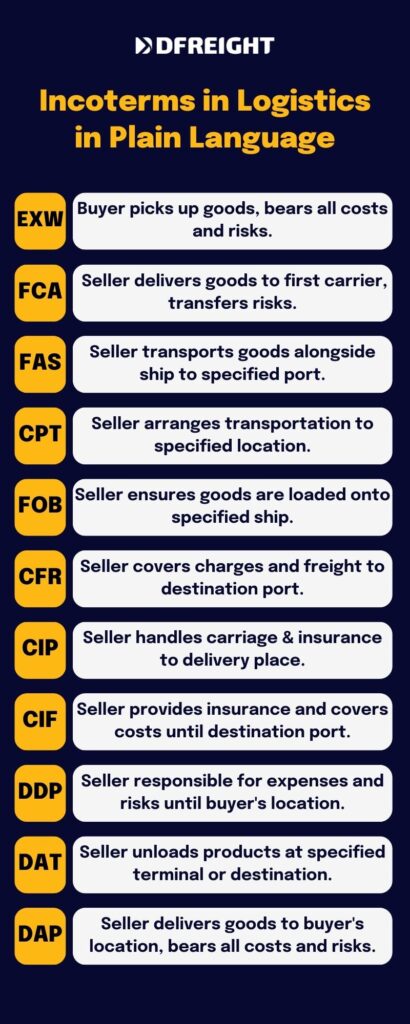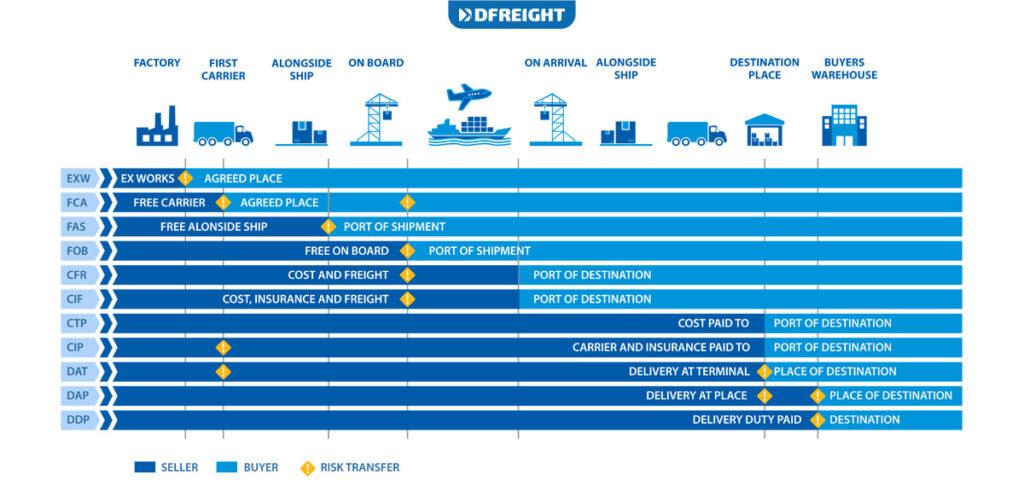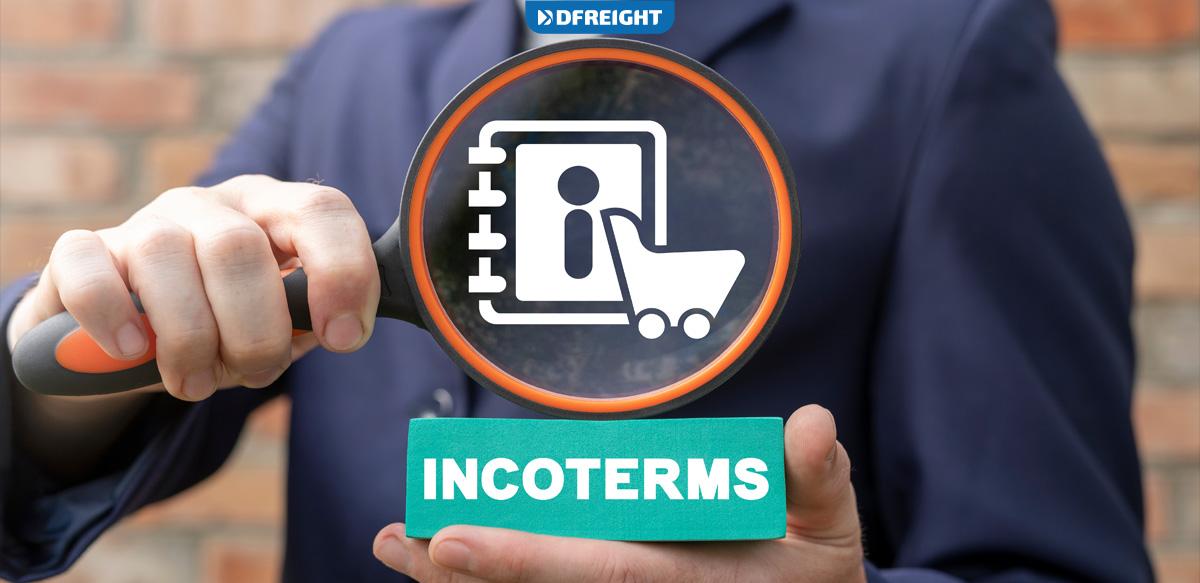You should be aware of the importance of incoterms in logistics before engaging in any foreign business transaction or signing any international shipment contract for shipping your goods to/from the UAE; it is critical to understand the rules that govern both the exporter and the importer’s responsibilities. This helps you avoid making costly mistakes that might lead to legal issues in the future. The Incoterms, which are special terms used between the parties engaged in a contract, is one of the most important issues. Anyone engaged in the trading world has to be aware of the importance of incoterms and know the incoterms meaning and details.
Table of Contents
What Are Incoterms?
International trade terms, or Incoterms, are a set of regulations that describe a business transaction between two parties: the exporter and the importer. They were established in 1936 by the International Chamber of Commerce (ICC) to regulate and oversee the sale of goods contracts in order to provide a more effective system of regulation.
Although the Incoterms 2010 version is still valid for older contracts (at this moment), the newest list of Incoterms 2020 version is suggested. One of its characteristics is the simplicity of the requirements that the contracting parties must fulfill. There are eleven distinct rules that clearly specify the duties, expenses, and dangers that must be accepted by both parties. We discuss the importance of incoterms since they involve details of risk transfer, the location of the goods’ delivery, the documentation to be handled, and determining who is liable for paying the shipping and insurance expenses.
If you find learning and remembering Incoterms hard, just use this guide. It explains all of them in a simple and easy-to-understand manner:
Advantages & Disadvantages of Using Incoterms
Advantages: The simplicity of contractual terms is one of the main advantages. Incoterms are frequently employed in commercial contracts to ensure a single interpretation of the terms, saving time and money that might otherwise be wasted due to misinterpretations, this sheds light on the importance of incoterms. The importance of incoterms is proven since they help the growth of international trade.
They provide a way for all businesses that utilize language to grasp what it means. These terminologies help carriers and purchasers comprehend the many scenarios that product shipments entail. The incoterms help buyers and carriers understand who owns the products and who pays the shipping charges at each stage of the shipment. Companies may use this advantage to prevent misunderstandings in many forms of international trade and business.
Disadvantages: One disadvantage opposing the importance of incoterms, is that many businesses are unable to keep up with all of the changes that occur. This might put some businesses in a better position while putting others in a not-so-good condition. Another issue with incoterms is that transportation companies and purchasers have opposing views on which terms should be used. CIF is preferred by sellers because it allows them to better understand their shipments, whereas FOB is preferred by buyers for similar reasons.
These are the most often used incoterms. Depending on your point of view, a term might be advantageous to you or not. Another downside of incoterms is that they are used by many transport companies. They frequently use one method for shipping and another for purchases. The goal is to save money while also gaining more control over the goods.
All Incoterms Together in One Place
All of the common incoterms used by buyers and sellers in international commerce are listed below and each one highlights the importance of incoterms:

1. EX Works (EXW)
EXW incoterm signifies that the buyer must pick up goods from the seller’s location. In addition, the buyer is responsible for any transportation charges and risks. It is the sellers’ duty to make the goods available at their given place. As a result, the buyer bears all costs and risks from the seller’s location to the buyer’s location. In this case, the vendor assumes no duty other than delivery to its location. We might claim that this is the most beneficial transaction term for the seller.
To find more about EXW incoterm keep reading EX Works (EXW).
2. Free Carrier (FCA)
Free Carrier (FCA) incoterm means the seller is responsible for delivering goods to the first carrier. All risks and costs are then transferred to the buyer. To put it another way, this is the next step up from Ex-Works when the seller is responsible for conveying the items to the carrier’s site. In other words, it is the seller’s obligation to deliver the goods to the very first transporter.
To find out more about FCA incoterm keep reading Free Carrier (FCA).
3. Free Alongside Ship (FAS)
According to the Free Along Side (FAS) incoterm, the seller is responsible for transporting the goods alongside the ship and to the port specified by the customer in the contract. In other words, the seller is still responsible for delivering products to the shipping business along with the ship. From there, the risk is transferred from the supplier to the buyer.
To find more about FAS incoterm keep reading Free Along Side (FAS).
4. Carriage Paid To (CPT)
In Carriage Paid To (CPT) incoterm, the seller’s role is limited to arranging for the transportation of products to a certain location. The seller is not required to insure the products. The risk, on the other hand, is transferred when the goods are handed over to the carriage.
To find more about CPT incoterm keep reading Carriage Paid To (CPT).
5. Free On Board (FOB)
With FOB incoterms, the seller must go one step farther than FAS and verify that the products are loaded onto the ship that the customer specifies/names in the contract. When the products are on board the ship, the seller’s risk is over.
To find more about FOB incoterms keep reading Free on Board (FOB).

6. Cost and Freight (CFR)
According to the Cost and Freight incoterm, the seller is responsible for all charges and freight associated with transporting the merchandise to the target port. In this instance, the risk is only passed to the other party when the products are handed to the ship. Till then, the seller is responsible for all preparations and expenditures, including transportation to the destination port.
To find more about CFR incoterm keep reading Cost and Freight (CFR).
7. Carrier and Insurance Paid To (CIP)
According to the CIP incoterms, the seller is responsible for the items’ carriage and insurance until they arrive at the target port or another delivery place specified in the contract. The risk goes to the other party when the seller sends over the products to the first carrier, even though the cost stays in the seller’s account.
8. Cost, Insurance, and Freight (CIF)
The main difference between CIF and CFR is that the seller is also responsible for purchasing and paying for insurance on the products provided in CIF, therefore, it’s necessary to master different incoterms since they are highly valued and it helps a lot if you put focus on the importance of incoterms. In the case of CIF, the sellers are responsible for all costs (including freight and insurance) until the shipment arrives at the destination port. At the same time, once it is delivered to the shipping company at the designated port, the risk is also transferred.
To find out more about CIF incoterm and the importance of incoterms for sellers, keep reading Cost, Insurance, and Freight (CIF).
9. Delivered Duty Paid (DDP)
The seller’s responsibility goes outside his own country in this case. And he is responsible for all expenses and hazards until the goods arrive at their designated location in the buyer’s country. In other words, the seller guarantees delivery of the products to the buyer’s country’s destination. After then, the buyer’s obligations begin.
To find out more about DDP incoterm keep reading Delivered Duty Paid (DDP).
10. Delivered at Terminal (DAT)
This term signifies that the seller is responsible for unloading and putting the products at the terminal at the port (or at the buyer’s specified destination). The seller is responsible for all risks and costs until the products are unloaded at the buyer’s specified terminal. To put it another way, the seller is responsible for everything until the products are unloaded/delivered at the specified location.
To find out more about DAT incoterm keep reading Delivered at Terminal (DAT).
11. Delivered at Place (DAP)
This incoterm is the opposite of Ex-Works, in which the buyer was responsible for everything. In a DAP incoterms agreement, the seller assumes all responsibility for delivering the products to the buyer’s location. This entails delivering products to the transporter or into his vehicle, with the agreement to unload or deliver the goods at the buyer’s location. Alternatively, we might state that the items are delivered to the buyer’s factory/warehouse or another site. Obviously, the seller bears all end-to-end expenses and risks until the product reaches the consumer.
To find out more about DAP incoterm and the importance of incoterms for importers keep reading Delivered at Place (DAP).
The Final Word
Incoterms, without a doubt, assist in the proper functioning of international trade and therefore, the importance of incoterms is discussed in this blog post. It specifies the buyer’s and seller’s duties at all stages of international trade. Incoterms, however, have their own limitations. The parties cannot, for example, use these terms to create contractual rights and obligations unrelated to the shipments. Furthermore, these terms do not provide a solution in the event that one of the parties breaks the contract’s terms. In other words, these terms are used to highlight the importance of incoterms that are used to describe the movement of goods, not the complete transaction or trade.
What incoterms are used in sea shipping?
Ex Works (EXW), Free On Board (FOB), Cost, Insurance & Freight (CIF), and Delivery Duty Paid (DDP) are the most used terms for sea shipping.
What incoterm can be used for any mode of transportation?
Considering the importance of incoterms, all incoterms, EXW term is more important than others since it can be used for any mode of transportation.
What incoterms are great for beginner importers?
DAT (Delivered at Terminal), DAP (Delivered at Place), and DDP (Delivered Duty Paid) are the best incoterms for beginner importers.














